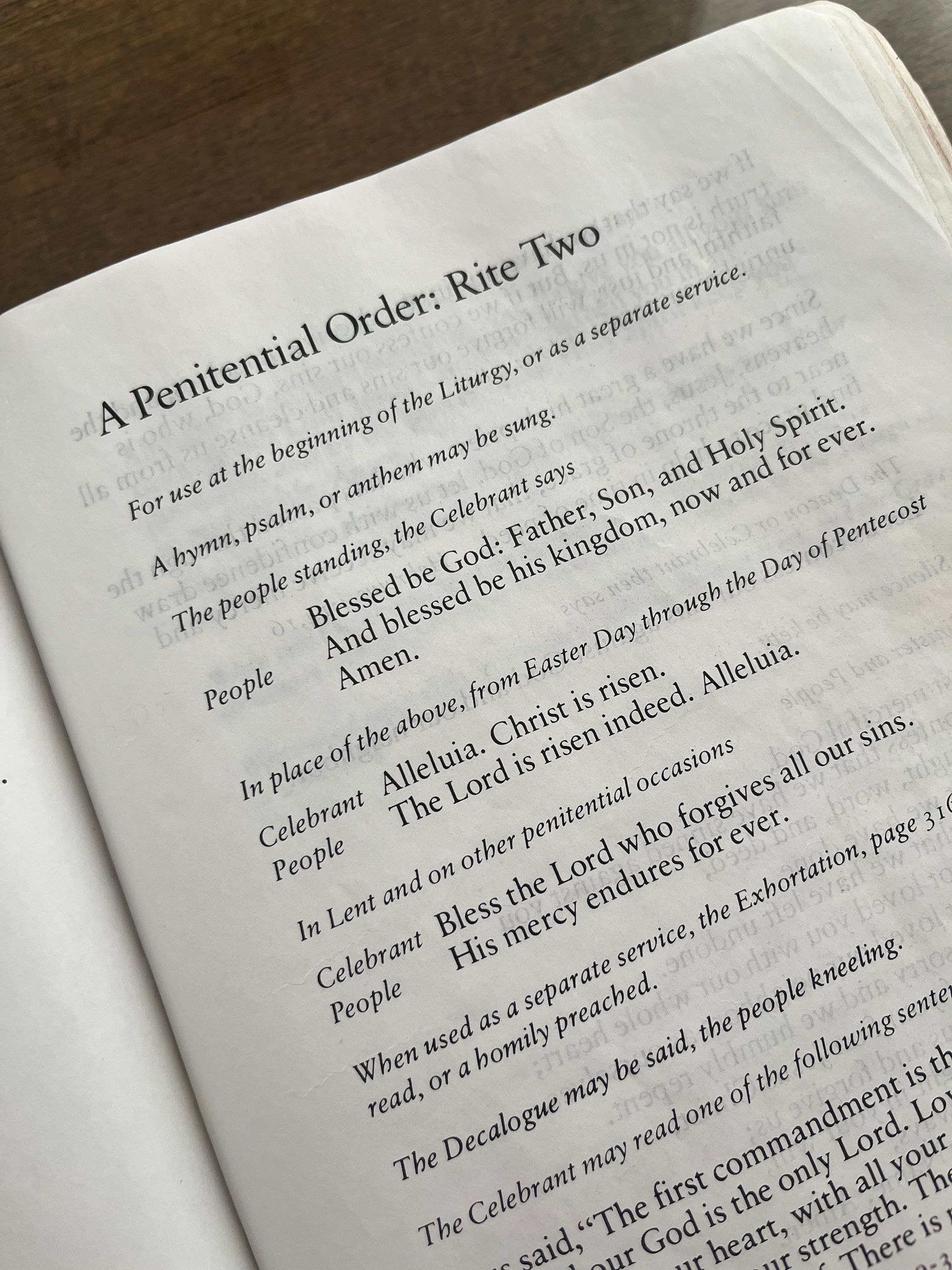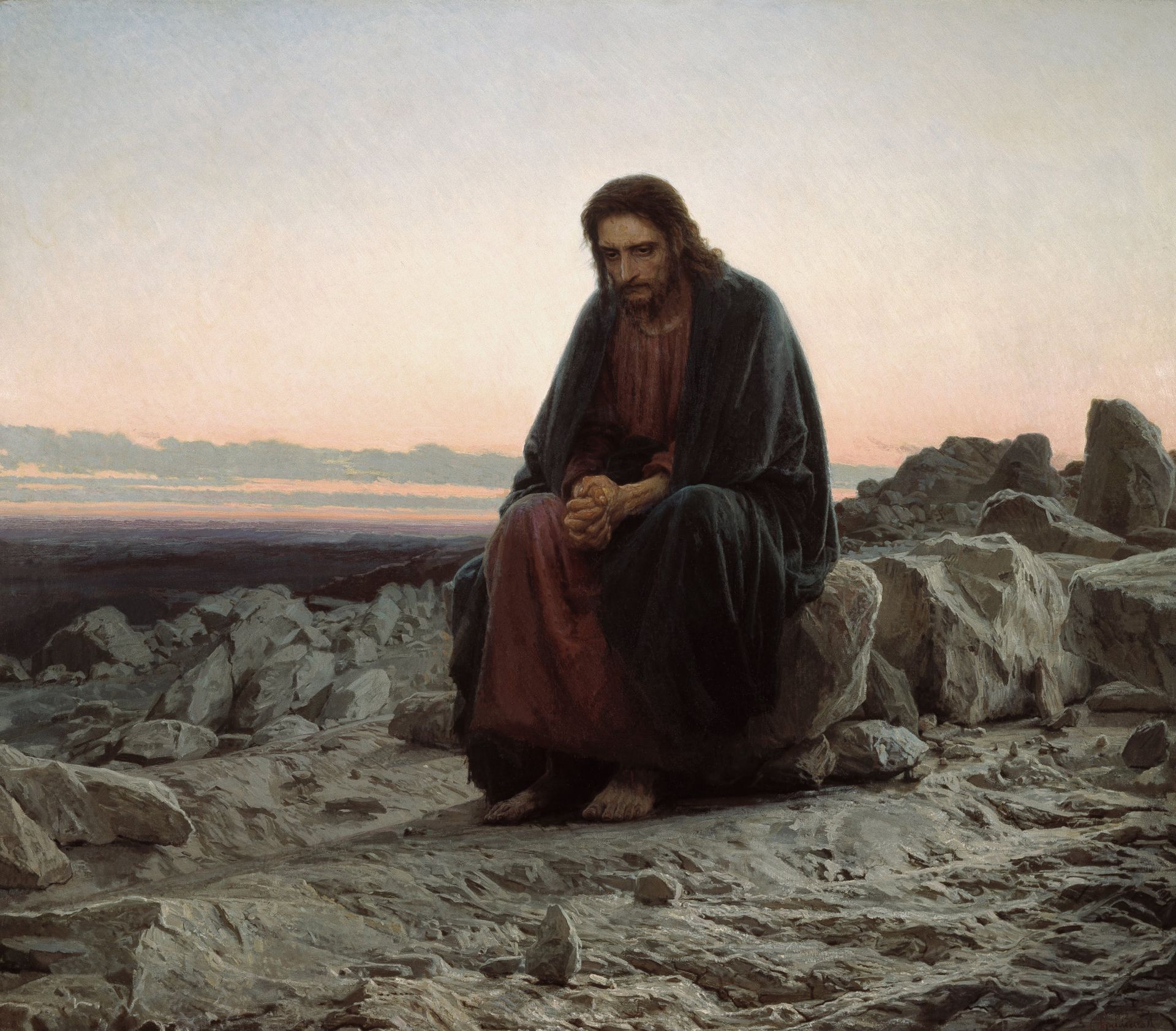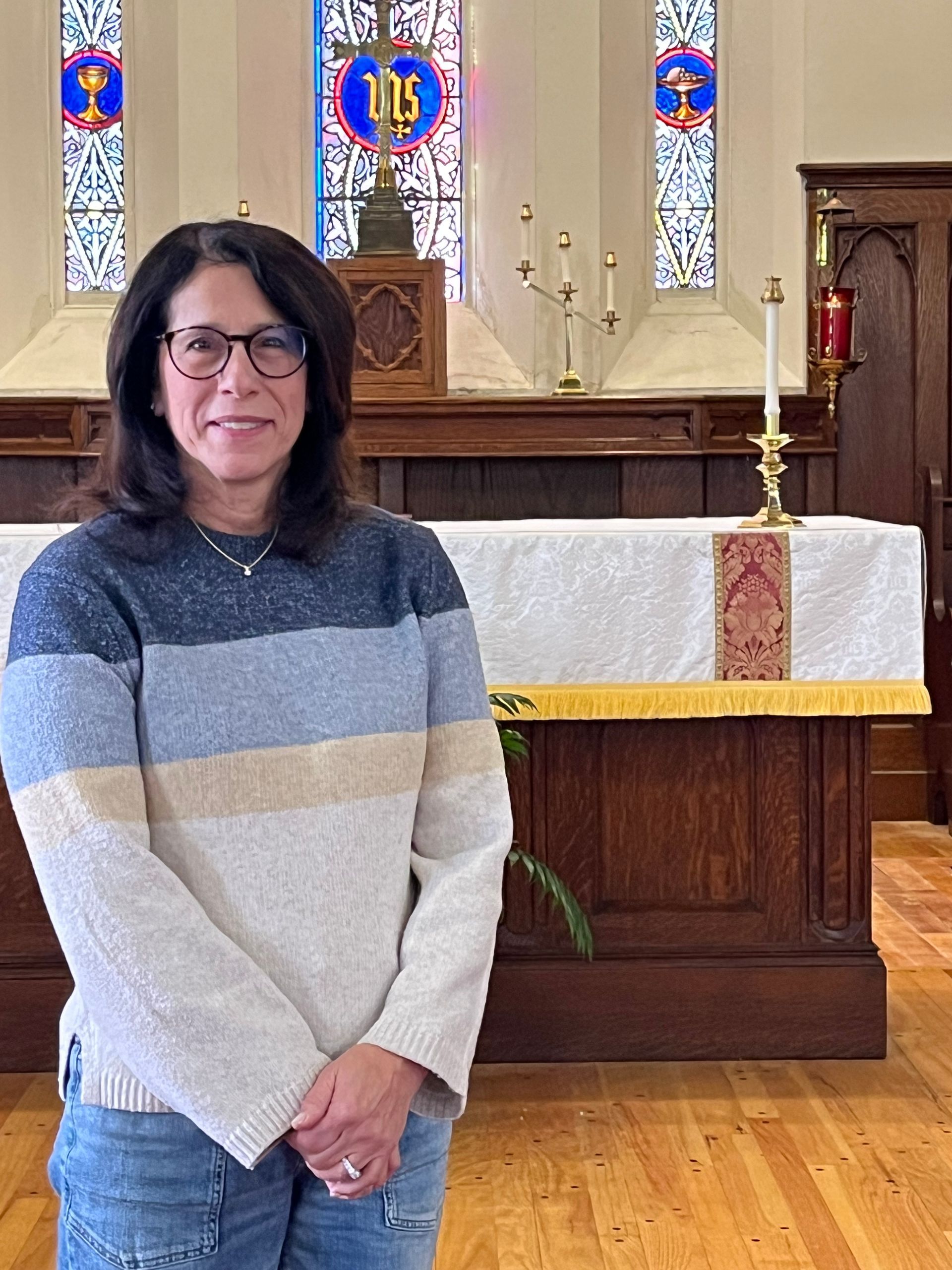Weekly reflections from the Rector on the Sunday Scripture readings, parish life, events in the wider community, and whatever else crosses his mind.Occasional posts from guest writers too.

This Sunday we are going to begin our liturgy in a slightly different way. I promise this will not be totally foreign as it is exactly what we did during Lent last year. Instead of beginning with those familiar words, “Blessed be God: Father, Son, and Holy Spirit” found on page 355, we will begin with something called “A Penitential Order” found on page 351 of the Book of Common Prayer. The opening sentence during Lent (regardless if we were beginning on page 351 or 355) is “Bless the Lord who forgives all our sins,” but unlike other times of the year over these next few weeks, instead of saying the Gloria (the prayer which begins “Glory to God in the highest”) we will kneel together and say the Decalogue (aka the 10 commandments). This is followed by a verse of Scripture (one of three options listed in the Prayer Book) and then the confession. Immediately after the confession and absolution we will say (or sing as the case may be) the Trisagion (Greek for “thrice holy”). This prayer, found at the bottom of page 356, invites us three times to proclaim something of God’s identity and then ask for God’s mercy (Holy God, Holy and Mighty, Holy Immortal One, Have mercy upon us). After this comes the collect of the day and then the services proceeds in the usual way. There are a variety of reasons for us to do this. First, there is a tradition in the church of using the penitential order during our penitential seasons (Lent and Advent). Second, it builds from the tradition where clergy and servers would say particular prayers prior to the start of the service to prepare themselves for ministry at God’s altar. Third, it is one of the many resources in the Book of Common Prayer that are available to our use. Fourth, it is good to do things differently from time to time so we do not get stuck in a routine - doing the same thing over and over again until it looses its meaning. Finally, I think there is something deeply appropriate to begin our worship of God in this humble posture. Lent is a time when we are invited to take a good, hard look at our lives that we might be honest with where we are. It is a time for us to be honest about our mortality and our sinfulness - though it is not about being self-deprecating or beating ourselves up. Lent is a time when we look deep within ourselves and admit that we do not always act as we ought to, and we do not always do things as we should. We all have moments we look back on to think, “Yup that was not my brightest moment.” Sin is everything that separates us from the love of God, and puts distance between us and our neighbors. Lent is a time when we can look at our behavior, recognize the sin, and make the choice to start again, striving to live into the fullness of the covenants we have made with God and one another. Beginning the liturgy with the Penitential Order allows us to enter into the house of God and begin our primary (and most important work) from a place of honesty and vulnerability. As God’s absolution is announce we rise from our knees keenly aware that it is only by the grace and mercy of God that we are able to do all which God has called us to do. In other words we begin our liturgy with a clean slate that we might try again we clear hearts and minds, not weighed down by the burdens we carry. Let us join together this Sunday, making a right beginning again, confessing our vulnerability, our brokenness, our shortcomings and failings to God, that together we may stand again, going forth into the world as a people who are strengthened, healed, and renewed.

Our annual Lenten pilgrimage has begun. Lent, it seems to me, is a profoundly misunderstood season. Over the years I have heard many share their dislike of this season because it is too dour. I have heard people lament that Lent is a time where we are told we are bad people; that it encourages a harmful posture of self-deprecation. There are good reasons for this. The Church has a long history of using language around sin as a weapon to manipulate and control people, and as a tool to demonize those who do not fit a narrowly defined standard of being in the world. Like some of you, I too have experienced this in my own life both as a lay person and as a priest. I do not fault a single person who is wary of Lent. And, I hope that together we can shift our understanding of this holy season. On Sunday we hear of Jesus’ time in the wilderness. After his baptism, Matthew tells us, “Jesus was led up by the Spirit into the wilderness to be tempted by the devil” (Matthew 4:1, NRSV). Our wilderness experience of Lent is rooted in Jesus’ own experience. It is a time to resist temptation, to refuse to put God to the test, to place ourselves firmly in the arms of God - trusting that no matter what God will not forsake us. This is our time to begin again by honestly naming where we are in this moment. We do this, in part, by naming our sins. It is important for us to be honest about all the ways we stray from the path of God, the barriers we put up to block God’s love from our lives, the ways we do not honor the belovedness of our neighbors. We name these things so that we can refocus ourselves on how God has called us to live. As we do so, we do not need to fear the wrath of a vengeful God. We can acknowledge these sins because our judgment is rooted in love. As we heard in the psalm on Ash Wednesday, “The Lord is full of compassion and mercy, slow to anger and of great kindness” (103:8, BCP p.733). Above all else, we name honestly the ways we have sinned as a statement of our commitment to strive for that still more excellent way, and our acknowledgment of our utter reliance on the mercy and love of God. The work of Lent - fasting, praying, reading and meditating on Scripture - are the disciplines that help train us to focus on God, not the idols of this world; to remove the blinders and stumbling blocks from before our path; to accept that we can only thrive in this life by the grace of God. I hope you will not give up on this season, especially if you have had a complicated relationship with it in the past. These times of difficulty and uncertainty are what Lent is made fore: uncertain wilderness times, when all seems bleak, and hope seems a distant luxury. Lent is made for times like these, for it draws us back to God - where all our hope is founded. Please accept the gift of this season. The invitation to strip away all distractions and return to what matters most - reorienting our lives towards God; trusting that God greets us with mercy and compassion; committing the fullness of who we are to the love of God.

As you know we were not able to gather for in-person worship last Sunday (February 8) due to inclement weather. I was disappointed to not have the opportunity to preach the sermon I wrote as it was inspired by a phone conversation I had with a parishioner during the week - a conversation I am profoundly grateful for, that raised the question: how are we called to respond to this moment in time? What follows is not the full sermon, but more or less the “so what does this all mean for us” part of what I would have preached. Before reading further, I invite you to read the lessons, especially the Gospel, from last week. You can find them here . Do you know what the mission of the Church is? I’ll give you a hint, it is printed on the front of our bulletins each week . . . The mission of the Church, as is stated on page 855 of The Book of Common Prayer is, “to restore all people to unity with God and each other in Christ.” This phrase has consistently been at the forefront of my mind, regularly emerging in my own prayer and discernment. In these reflections I have also found myself wondering, how are we (individually, collectively, the entire body of Christ) doing at living out this call? So, beloved of God, I ask you, as we look out on the Church and the world, how are we doing at living into this vocation? Has this mission been achieved? Are we making progress towards its fulfillment? Have we missed the mark in living out this life of reconciliation? Or, option D, some combination of all of the above? I wonder, how do we feel we are doing at living out this vocation here in this community? As the household of God at St. Thomas Church are we reconciled one to another? Paired with this mission statement, I have also found myself regularly turning to words from St. Paul in his First Letter to the Corinthians “As it is there are many members, yet one body. The eye cannot say to the hand, ‘I have no need of you’ . . . If one member suffers, all suffer together with it; if one member is honored, all rejoice together with it” (full passage 1 Corinthians 12:21-27, NRSV). Most striking in this, what rings loudest in my ears, is Paul’s counsel that no part of the body can say to another, I have no need of you; no member of the community can say to another member - you are not welcome or needed here. I wonder if the Bishops of the Episcopal Church had this in mind when they recently wrote, “The question before us is simple and urgent: Whose dignity matters? Our faith gives a clear answer: everyone’s” ( A Joint Letter from 154 Bishops of The Episcopal Church: Whose Dignity Matters? ) So what does all of this mean for us as the household of God at St. Thomas Church? A community that is not of one mind on any issue with the exception of our fondness for this place and our love and faith in Jesus. (For what it is worth, I do not think it is a bad thing that we represent a diversity of views and ideas). How are we being called right now to be the salt of the earth and light of the world in an increasingly bland and dark world? First and foremost, I hope it goes without saying that it is contrary to our faith to villainize those we disagree with. As Jesus says in the Sermon on the Mount, “Love your enemies and pray for those who persecute you” (Matthew 5:44, NRSV). As our Bishops make clear in their statement, the dignity of everyone, without exception, matters. If we truly believe what we profess then we must recognize there is no such thing as an evil person - every single person who was, who is, who is to come is a beloved child of God; made in the image and likeness of God. That does not mean, however, that people do not do horrific and evils things; nor does it mean people should not be held accountable for their actions. As we look at the full scope of Jesus’ ministry, as we look at the disciples and all that they did in Jesus’ name as they endeavored to be salt and light, there is something very important we need to notice. Everything Jesus does, everything the disciples do, is about addressing the needs before their eyes - what is afflicting the people right in front of them. This does not mean that they were ill-informed or did not care about the behavior of the leaders of the Roman Empire; but I think it does mean that they recognized where their ministry could do the most good. There are innumerable needs and things to be done here in this community and around our state. Instead of stewing in anger, righteous as it may be, at things happening that are far beyond our control let us focus our attention locally where we can do the most good. I invite you to explore local, independent news outlets tracking local legislation and community meetings so that you can go and make your voice heard. I invite you to pay attention to our weekly email newsletter, the bi-weekly news from the Diocese, and the social media accounts of communities throughout our Diocese which regularly share opportunities to live out our faith in a multitude of ways. I invite you to go to the parish library and read the books on anti-racism, immigration, indigenous communities, full-inclusion of LGBTQ+ people, interfaith connections, and radical welcome of all people in the Church regardless of difference that we might be better informed and educated on the issues of our day and the intersection of those issues with our lives of faith. I especially invite those of you who did not participate in the formation and education programs around those topics to do so. I invite each and everyone you to commit yourselves to coming to church every single Sunday we are here that our worship might propel us into the world to make our faith incarnate. I invite you to talk to one another, respectfully and honoring the different view points and opinions we have, that we might learn from one another and be an example to this fractured world of what is possible when dignity and respect are afforded to all. I invite you, to, as Bishop Knisely recently wrote to the clergy of this Diocese, have grace with one another trusting that we are all doing the best we can to discern how we are being called to respond to these times. I invite you, for as long as I am serving as your Rector, to come and talk with me - let me buy you a cup of coffee or tea - and discern with you how God is calling you in this moment. There is plenty of meaningful work to do, so let us not waste time on that which will do nothing other than add to the hate and vitriol around us. Let us be about the work of the Gospel and focus our attention on where we can make a difference. Beloved of God, I dare you to actually be salt and light. If you accept this challenge I think you might just find that there are indeed brighter days ahead.

Reflection by Linda Dickey, Vestry Member Good morning. I am here as the last speaker for our Stewardship Campaign this year. The Stewardship Committee gets up here every year, and we humbly ask for your resources for our parish – your time, talent, and treasure, in order to keep our parish going. This year has been particularly challenging, knowing how difficult the world is right now for so many. We understand that the cost of everything has risen, and that many of us face insecurity daily. Even those of us still working are facing the threat of layoffs every day as we head off to work. We get it, and understand that this is not an easy ask. So, we don’t ask lightly or flippantly. We get up here to tell what St. Thomas means to each of us, and why we all need to pull together to meet our budgets and continue our mission and ministry. Several of us have spoken during the past few weeks about our love for St. Thomas and the community here, which includes each of you. I know each of you feels similarly about our parish, or you wouldn’t be here today, and faithfully week after week. Lisa and Josh spoke about what St. Thomas means to each of them, and last week Jacki gave us two different scenarios about what our parish could look like in 10 years. This is really hard. We have just heard a painful announcement by our Wardens. We have to face the sobering reality that the economic climate is forcing us to make some real soul-searching and burdensome decisions about what to do with our resources, both as a parish and personally. This was a difficult announcement to hear, and to make. It is discouraging and scary. Yet before anyone despairs, we need to remember that St. Thomas has survived. Our Parish has survived for 175 years. God has seen us through so much. There have been good years and lean years. Starting in 1851, we have held firm through the Civil War, the Great Depression, two World Wars, and countless other recessions, and global conditions. We even got through the bad fashion choices of the 1970s. Despite what was happening in the world, those who came before us held on. Our predecesors at this church have made the necessary sacrifices to survive, and to make sure the ministry of St. Thomas continued. They made sure that this church continued to stand as a witness to God’s love in our community. I am fairly new here, but I came here one week back in 2012, when the pews were packed, and a number of mothers and babies sat in the back. My son and I had just stopped in, on a whim. Life moved on, and he graduated high school and went on to college, and I moved out of the area. Ten years later, in 2022, I came back here alone, still traumatized by a recent divorce, and Cate immediately took me under her wing at the front door. In the fellowship hall, Mimi approached me and said she remembered me and my son from that one visit ten years before, and I ran into Jacki, whose son I used to babysit for more than 40 years ago. St. Thomas immediately felt like home. It is a place where all feel welcome and loved, and the compassion of Christ lives on. Through the years many in our families have been baptized at this font, married at this altar, and bid goodbye to here. For generations, this church has been a sanctuary, where we have been nourished at this table, where we have found friends to celebrate with us in our joys, and comfort us in our sorrows. Here, we have learned what it means to love our neighbors, to seek justice, and to meet God and walk humbly with him. We do not want to be the generation that loses what so many before us worked so faithfully to build . We are the beneficiaries of their sacrifice and faith, and now we must become the stewards of tomorrow’s blessings. And yet, this is not a moment for despair. It is a moment when we live up to our calling. God has always provided for this church, and for each of us individually. His provision has arrived not through chariots and miracles, but through the generosity and faithfulness of His people. The provision we pray for becomes real when we choose to give boldly and lovingly, believing that this church still has holy work to do. God is not finished with us. There have been lean times throughout our history, but here we are, about the celebrate our 175 th anniversary. I intend to be around to see our 200 th , although it may be close. Some of our very youngest may even see our 250 th , along the way seeing their own children baptized and married here. Most of us have been around long enough to know which things in life are important and here to stay and which things are just passing. Our parish and its place in our lives and the lives of our families and community are among the most important. Those who came before us gave with courage, often out of scarcity, trusting that their offerings would sustain a church they loved. Christ fed 5000 people with a few loaves and fishes when it was given willingly and in faith. Those before us gave in faith, love, and trust, and when they joyfully offered back to God what had been given to them, He blessed it and multiplied it. Today, their trust lives on in us. This year, your pledge carries extraordinary significance. It is more than a number. It is a declaration that this church’s ministry matters. That its future matters. That the story of 175 years is not ending on our watch. That we have the Courage to Remain. Prayerfully consider how God might be calling you to respond. Let your pledge be an act of gratitude for all this parish has been—and an act of hope for what it can still become. There are pledge cards available at the front door or in the parish hall. There is also a link in the parish newsletter to give online. Our in-gathering will be on December 7 th . May God strengthen our resolve, deepen our generosity, and lead this beloved parish into a future shaped by faith, secured by hope, and sustained by love. Thank you

Reflection written by Josh North, Vestry Member So every year the vestry retreat starts the same way with Dante asking us to introduce ourselves and say how long we have been a member of St. Thomas, which always makes me go “oh come on”, don’t worry it’s not the name part that trips me up, it’s how long I have been a member of St. Thomas. Allow me to explain. My church upbringing has not been what you normally hear, there are some here who have been here all there lives and many who are on there second church, well for me this is my fifth church. My faith journey actually starts 3 years before I’m born in 1990, when my mother was ordained a deacon in the diocese. I have been privileged to be in churches where the average Sunday attendance is 150 and ones where it is 10. So what does this have to do with stewardship at St. Thomas? Well this is one of the most welcoming and loving communities, the way everyone looks out for and helps each other. These factors are what made me choose to come back to St. Thomas in 2018. I have loved to grow my faith here. I love that members here have become like family. By giving to St. Thomas you will be giving others the opportunity to experience the wonderful community here. These factors are the reason I’m giving to St. Thomas and I hope you will too.

Happy Allhallowtide! All-hallow-what? You might be asking yourself. Yes, it is Allhallowtide, or as some have referred to it the Autumnal Triduum, or even the Triduum of Death - though I’ll admit this last one sounds like the name of the latest blockbuster horror film, not a liturgical season. Allhallowtide is the name given to a series of three days where we give thanks for the lives of those who have died. Today, October 31 is All Hallows’ Eve. On this night the Church celebrates the Vigil of All Saints Day, with fasting and praying in preparation for the great feast that is to come. It is sometimes said that the veil between this world and the realm of the dead is thinnest on this day - hence ghouls and goblins walk the night. Where candy comes into play, I do not know, maybe from traditions of leavings gifts for the departed. Regardless of the origin, I am not saying no to a Reese’s pumpkin or a handful of candy corn. This year we anticipated this commemoration a bit early with our 4th annual Trunk-or-Treat celebration on Sunday, October 26. Thank you to all who came out and made sure it was a fabulous celebration. Thus marks the first day of Allhallowtide. Tomorrow, November 1 is All Saints’ Day. It is also referred to as All Hallows’ Day (where All Hallows’ Eve gets its name from), or Hallowmas. The word “hallow” means holy. For example in the Lord’s Prayer when we say, “Hallowed be thy name” we are proclaiming the holiness of God’s name. On All Saints’ Day the Church honors the Saints in heaven, and reminds us of our unity in the body of Christ which cannot be destroyed by death. On this day, we look to the saints of ages past for inspiration as we strive to live lives of holiness: people like St. Thomas, St. Peter, St. Paul, and others on our liturgical calendar. We will keep All Saints’ Day on the Sunday following, this year November 2. At both liturgies we will renew our baptismal vows, recommitting ourselves to the covenanted relationship we have with God. On All Saints’ Day, and the Sunday after, we remember our Baptism, willingly giving our lives, for we mean to be saints too. Thus marks the second day of Allhallowtide. November 2, is the Commemoration of All Faithful Departed, also known as All Souls’ Day. It is on this day that we commemorate, as the name says, all the faithful departed. On this day that we remember those faithful people from our own lives who no longer walk this earthly pilgrimage with us. On this day we pray, “O God, Maker and Redeemer of all believers: Grant to the faithful departed the unsearchable benefits of the passion of your Son; that on the day of his appearing they may be manifested as your children” (Lesser Feasts and Fasts 2006, p. 439). Over the last few years it has been our practice to gather on the evening of November 2 for a Requiem Eucharist for All Souls. However, this year things are a little different: in part because November 2 falls on a Sunday, and in part due to my physical limitations. Instead of gathering for a separate liturgy this year, we are going to incorporate one of our All Souls’ practices into our All Saints’ day worship. On All Souls’ Day we include in the prayers of the people, a list of names of all our beloved dead. This year, that list will be included in the prayers of the people on Sunday morning. All are invited to submit names, even if you are not able to join us on Sunday morning. Please do email me names no later than tomorrow (Saturday) night. Thus marks the third day of Allhallowtide. These three days: All Hallows’ Eve, All Saints’ Day, and All Souls’ Day come together to form Allhallowtide. I hope you will join us as we keep these days in which we celebrate the saints of the Church, remember and give thanks for our beloved dead, and look forward to the hope and promise given to us when we have completed our earthly pilgrimage.

This is one of the most glorious times of the year. The leaves are turning, its finally sweater weather, and life in the parish is blossoming once more - not that there is ever really dull moments around here. In the weeks ahead we will continue to have wonderful occasions to gather together for friends and fellowship, for spiritual renewal, and for various fundraising opportunities. As I look at the calendar through the end of the year it is clear we have opportunities to deep our lives in all aspects of parish ministry. This Sunday we gather for our 4th annual Trunk-or-Treat. Word on the street is I’m not the only one giving out full sized candy bars this year! This is a favorite event as it is a time for us to be silly together, to laugh, and enjoy one another company on a beautiful (fingers crossed) fall day. On November 8 our 4th Vendor Faire season kicks-off. It’s hard to believe we are already at the fourth season. Thanks to the wonderful leadership of our fundraising team this effort is now well known in the community, gaining a following of its own. If you have not been to a Vendor Faire yet please make every effort to come on our this year. Not only is it important to support the local vendors with their wonderful creations, it is also a time of fellowship, where relationships are built between people who would not have met otherwise, and, it is an important fundraising opportunity for our community. In addition, this year the November Vendor Faire will also include a blood drive. You can find more information on that later in this update. When you come on a Vendor Faire day there is more than just what happens in the parish hall. The Church Mouse is in high gear too! Open an hour earlier than a typical Saturday, and there is the addition of yard sales in the parish hall basement. It is a time of special activity and excitement. Along with these opportunities of fellowship and fundraising we have opportunities for renewal of faith as well. Our Episcopal 101 course kicks off next week (more information below) is an opportunity for cradle Episcopalians and people new to our tradition to learn more about our way of being the Jesus movement. On November 16, Bishop Knisely makes is official visitation. He will be with us as celebrant and preacher, led a forum between the liturgies, and meet with the vestry. While here he will also confirm and receive several members of our community. You may remember that we have begun a pattern with our friends at the Church of the Redeemer, Providence for joint quiet days in Advent and Lent. That will continue this year. On December 6, all are invited to attend this year’s Advent Quiet Day at the Redeemer led by Sr. Sarah from the Society of St. Margaret. More on that to come. And we cannot forget our Thanksgiving and Christmas outreach project either. The Thanksgiving Basket Drive is already underway, and before we know it the Giving Tree will be upon us. Sign up sheets for the Thanksgiving Baskets are on the ministry table in the parish hall. It is a wonderful gift to have a community filled with such life. I invite you to take full advantage of it. Make yourself available for all that we have to offer. Immerse yourself in fellowship, share in the work of fundraising, commit to deepening your spiritual life, help care for our neighbors. This is what being the Church is all about. I hope you will come and join us.

Post Written By: Josh North, Vestry Member While you may have heard of Dollar Sunday, you may not know its origin. The idea came from dedicated parishioner Al Parrillo, who believed one Sunday each month should be set aside to collect funds specifically for the maintenance and preservation of our beautiful church property. This month, our Dollar Sunday focus will be on the memorial garden. We are hoping to raise $500 to help cover expenses for some projects to help with covering an electrical conduit, painting, fencing, and other needs to prepare the area. As both a Vestry member and a fellow parishioner, I see the great love and generosity you all show this church every day. I know you give freely, and I humbly ask that you consider making a contribution—large or small—to this month’s Dollar Sunday goal. Your help is essential to making this project a reality. Thank you so much for your continued generosity.


